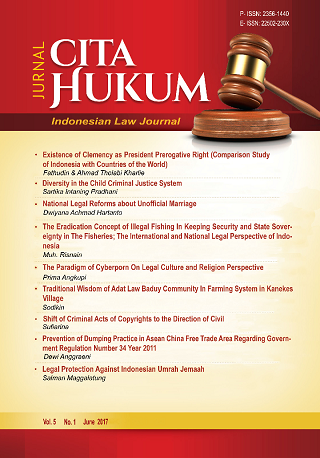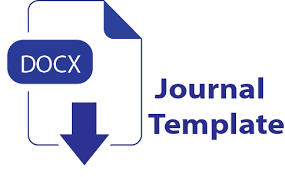Politik Hukum Ratifikasi Konvensi PBB Anti Korupsi di Indonesia
DOI:
https://doi.org/10.15408/jch.v4i2.4099Keywords:
Ratifikasi, Konvensi PBB Anti Korupsi, Indonesia.Abstract
Abstact : This study sought to see an international legal ratification of UN conventions in the form of anti-corruption and its impact on the internal environment of a country, especially Indonesia.Corruption is a never-ending problem discussed and resolved. Corruption became the nation's disease because it has been longstanding, massive and systemic. Corruptions become a disaster for the national economy and undermine system of governance. Corruption is not merely the loss of state money, but the impact on poverty and the miserable life of the people. Indonesia considers the UN anti-corruption convention is quite important in the effort to uphold the "good governance" and create a climate conducive to investment. International cooperation is needed to resolve the problem of corruption in order to prevent and eradicate corruption, of course, need to be supported by integrity, accountability, and management of good governance and the nation Indonesia has been active in the international community's efforts to prevent and eradicate corruption to have signed the United Nations Convention against Corruption, 2003 (United Nations Convention Against Corruption, 2003). Ratification is an attempt to construct the identity of Indonesia that first acts as a corrupt country into a country that has a desire to create a clean government.
Abstrak: Tulisan ini mencoba untuk melihat ratifikasi hukum internasional khususnya konvensi PBB anti korupsi serta dampaknya bagi kondisi dalam negeri sebuah Negara, khususnya Indonesia. Indonesia memandang konvensi PBB anti korupsi cukup penting dalam upaya menegakkan "good governance"dan menciptakan iklim investasi yang kondusif. Kerja sama internasional diperlukan untuk menyelesaikan masalah korupsi ini dalam rangka pencegahan dan pemberantasan tindak korupsi, tentunya perlu didukung oleh integritas, akuntabilitas, dan manajemen pemerintahan yang baik. Indonesia telah ikut aktif dalam upaya masyarakat internasional untuk pencegahan dan pemberantasan korupsi dengan menandatangani Konvensi Perserikatan Bangsa-Bangsa Anti Korupsi, 2003. Ratifikasi merupakan upaya konstruksi identitas Indonesia sebagai negara yang korup menjadi negara yang mempunyai keinginan untuk menciptakan pemerintahan yang bersih.
References
Abdurrasyid, Priyatna, “Instrumen Hukum Nasional bagi Peratifikasian
Perjanjian Internasional” dalam Majalah Hukum Nasional BPHN, No. 1
Tahun 1991, BPHN, Jakarta.
Adler, E, Seizing the middle ground: constructivism in world politics. European
Journal of International Relations, 3 (3), 1997.
Juwana, H, Hukum Internasional Sebagai Instrumen Politik: Beberapa Pengalaman Indonesia Sebagai Studi Kasus. Arena Hukum, 5(2), 2013.
Kian Gie, Kwik, Pemberantasan Korupsi Untuk Meraih Kemandirian, Kesejahteraan, Kemakmuran dan Keadilan. Jakarta: tanpa penerbit, 2003.
Klitgaard, R, Controlling corruption. California: University of California Press, 1988.
Klotz, Audie, Norms in International Relations: The Struggle Against Apartheid. Ithaca: Cornell University Press, 1995.
Kratochwill, Friedrich V, Rules, Norms, and Decisions: On the Condition of Practical and Legal Reasoning in International Relations and Domestic Affairs Cambridge: Cambridge University Press, 1989.
Kusumaatmadja, Mochtar, Pengantar Hukum Internasional, Buku I Bagian Umum. Bandung: Bina Cipta, 1981.
Reus-Smith, Christian, Constructivism dalam Scot Burchill, Richard Devetak, (et all). Theories of International Relations, Second Edition. New York: Palgrave, 2001.
Reus Smit, Christian, The Politics of International Law. Cambridge: Cambridge University Press, 2004.
Risse, T, “Let's argue!”: Communicative Action in World Politics. International organization, 54(01), 2000.
Wendt, Alexander, Social Theory of International Politics. Cambridge: Cambridge University Press, 1999.
Wendt, Alexander, The Agent Structure Problem in International Relations Theory, International Organization, 1987.











